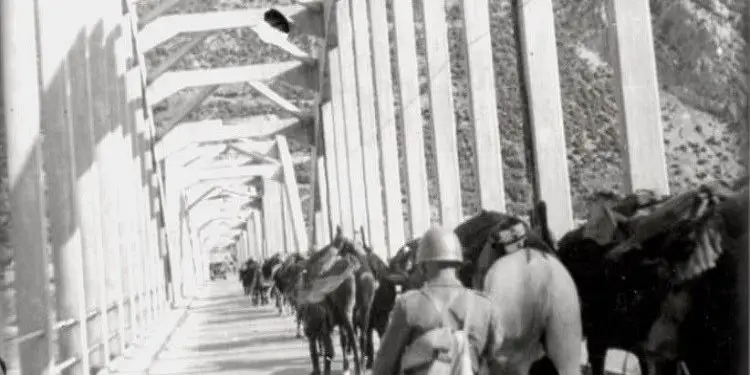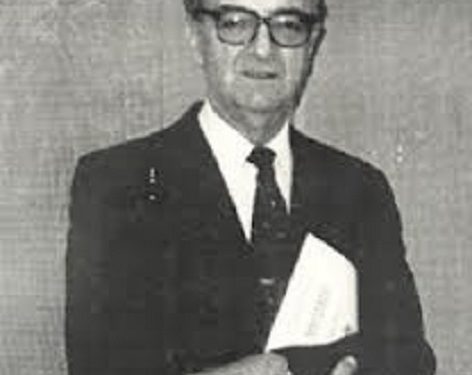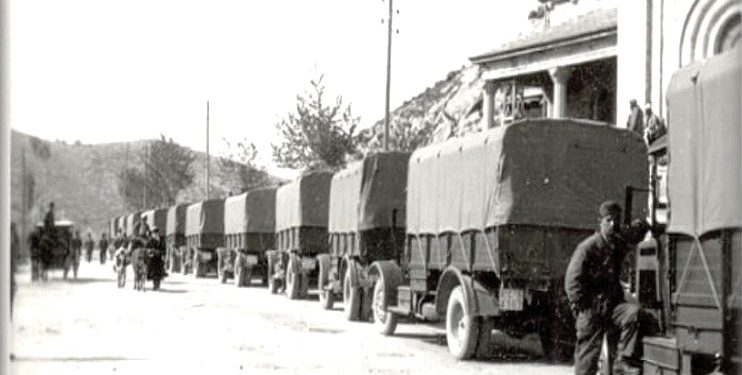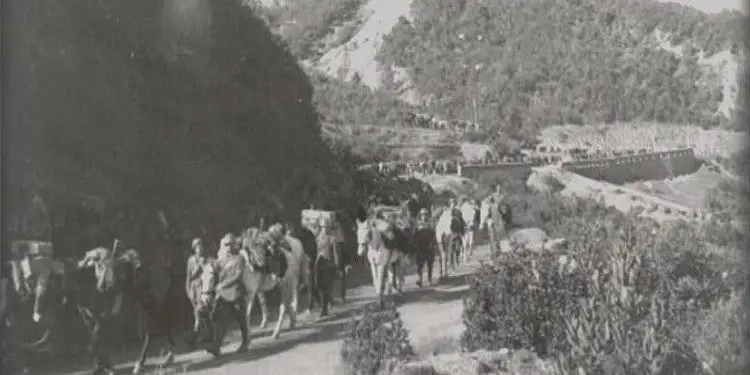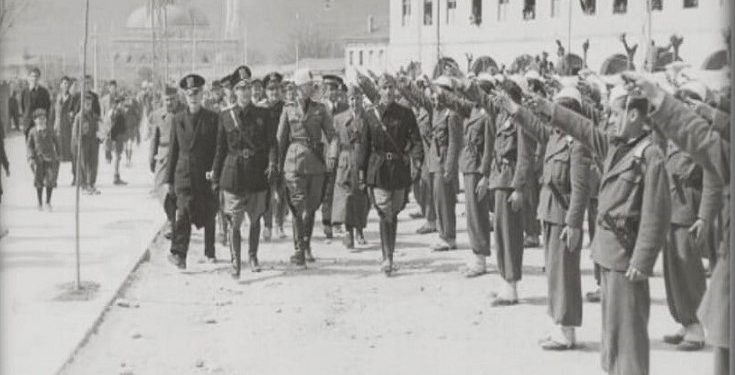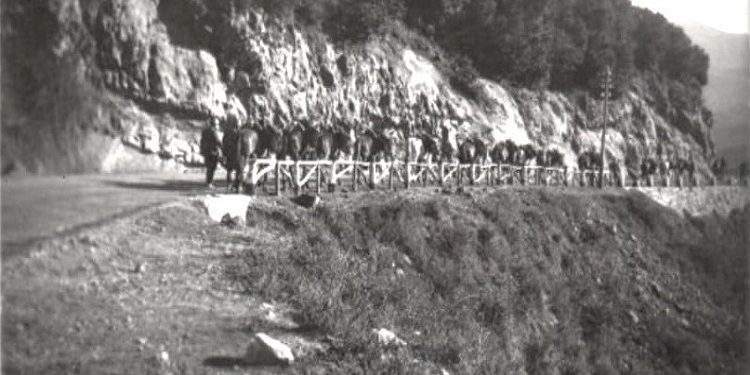By SAMI REPISHTI
Part Two
Sami Repishti: – “In Albania, the communist crimes of the past have not been documented or punished; there has been no ‘spiritual cleansing,’ no conscious confession or denunciation of the ordinary communist criminals!”
Under the Shadow of Rozafa
Memorie.al / During the 1930s and 1940s, with the relentless fascist and communist onslaught on Europe, sooner or later, the “fate” also seized the Albanian nation. Like all young people, I found myself at a crossroads where I had to take a stand, even at the risk of my life. At that moment, I said “no” to the dictatorship, took the path that seemed endless, a sailor in the vast sea, without shores. The rebellious act that nearly killed me simultaneously liberated me. I am an eyewitness to life in the fascist and communist hell in Albania, not as a “politician,” or a “personality” of the macro-political landscape of Albania, but as a student, as a young person who became aware of my role, at that time and in that place, out of love for my homeland and the desire for freedom; simply, as a young person with a pronounced sensitivity, loyal to myself and to a life of dignity.
Continued from the previous issue
In the middle of September, schools opened. The classrooms were packed. We reunited with one another after a three-month separation. We are high school students! But not all of us continue our secondary studies. One of my neighbors, a classmate, had to interrupt his education because his father, a worker in a tobacco factory, needed his twelve-year-old son’s help. The beginning of each school year in a new class created a certain insecurity before the difficulties that awaited me. Later, I adjusted, and each day brought confidence in my ability. A routine life began, with the professor’s explanations, homework assignments, extracurricular readings, and preparations for the trimester exams. Student life…! For our class, the most engaging subject was Albanian literature.
It was born centuries ago, but developed late and in an environment unprepared for it; it produced much, especially in epic forms, where it called on the fighting sentiments of a people that needed resilience for survival. We read magazines, newspaper articles, translated books, and publications from the past which were very few, quenching our thirst for early readings in foreign languages. We eagerly awaited every original work, reading with curiosity every new production, especially poetry, and we honored poets and writers. They were our pride!
Twenty-five years ago, independence was won! In a small town of our homeland, the national flag was raised. Our homeland was declared free. Fiery oratory filled every public gathering, every event prepared for celebration, even in our class. In the schoolyard, the professor lined us up. We were preparing for a celebration. The streets were adorned with flowers and red and black flags. The balconies of some houses had flowers and flags. Signs and slogans were everywhere, alongside loud cheers, musical sounds, and calls of enthusiasm.
The elders shared their memories. Everyone was dressed for the celebration, especially the highlanders in their traditional costumes. Policemen in uniform maintained order. Singing continued without interruption, and when someone shouted “Long Live Albania!”, thousands of voices responded in unison, “Long Live.” An atmosphere that left no room for thought swept us away, shaking us like the waves of the sea. One flag was adorned in golden colors; it was that of the women’s high school.
A woman prayed to take her place in the front row. Children looked on in wonder. From time to time, they were lifted onto shoulders. The crowd grew, and everyone tried to see something. They shouted loudly, gesturing with their hands and scarves. The booming sounds of cannon fire for the celebration were barely heard. The sounds of the municipal band came muffled. It was true chaos but wrapped in the great fabric of complete joy. The ceremony began! Patriotic songs, music, calls, and speeches. Applause, cheers, and once again, speeches.
It seemed that everyone wanted to express what they felt. It was a whole people touched by emotion, intoxicated by the grandeur of that commemoration, eager to celebrate the freedom they had won at such a high cost. Commemorative evenings in clubs and cultural halls, dinner for officials, songs, and dances continued late into the night. It was the grand celebration of a small but free people! Joy outside, joy at home, joy in our hearts.
***
“Uprising”! “Uprising”! The local newspapers write that peasants deceived by some individuals who do not love their homeland had attacked the public order forces in their attempts to overthrow the state and legal order. But the government, which had the interests of the people at heart, would act energetically; order would be secured, and the homeland would be saved. The people would continue their lives free. The guilty would be captured and punished according to the laws in force.
The newspaper explained that there had been some clashes with the insurgents, that blood had been shed, that there had been casualties, and those who had survived were found in prison…! “The polished boot has defeated the peasant slipper this time as well,” I heard from the students of the higher classes. The law ordered the establishment of the three-pronged approach, and the thick walls of medieval prisons would shelter the headstrong peasants for many long years. They would be thrown into damp and dark cells and would no longer be able to disturb the peaceful life of the people…!
After the uprising was suppressed, discussions did not cease. Some approved it; others scorned it. In every free moment during class hours, the uprising became the essence of our conversations and provided an opportunity to delve into other subjects for discussion. We, the lower classes, listened attentively to every word, and for the first time, in our ears rang words and expressions that the teacher did not say, nor did we find in books.
The students of the higher classes spoke loudly, expressing their views with fervor: scenes of misery drawn from the hard life of the Albanian peasant. They described the situation in our villages, painting in detail the great poverty of the laborers, speaking of the overwhelming exhaustion of the peasant crushed by misfortune, his sick wife, his unhealthy children, and his bare hut.
Then the poor harvest was described, made even worse by the taxes imposed by force, and the portion that belonged to the landlord, since the land was not owned by those who worked it. Some referred to the uprising as the brave act of a peasantry that could no longer endure, provoked by misery, tired of the cries of starving children, and crushed by hard and unproductive labor—a peasantry that cursed everyone and everything: the landlord, the gendarmerie, the state! Others were not satisfied with cursing. They did not stop in the middle of the road where the curse had brought them. Their spirits had reached a breaking point, cursing God and all the saints, despising laws and customs, and driven mad by the misery that crushed them, they gained the courage to attack anyone who stood in their way, by any means they could. Suffering had turned them into beasts!
But “the civilized society” opposed them! It fought them, captured them, punished them, and imprisoned them. In the abandoned families, where only poverty was abundant, women without husbands and children without parents fought every day against the hunger that threatened them. Meanwhile, in the dark prisons, the father and husband rebel filled their hearts with hatred and hostile feelings, which promised nothing good for the future. This is what the students of the higher classes conveyed. It was precisely during these days, in a tense situation, that I saw for the first time a page of anti-government propaganda material.
At first, I did not understand. But when my friend urged me to keep it secret and read it only at home, I realized it was something completely new for me. For the first time, I held in my hands material that was entirely different from what I was learning in class, reading in the press, or hearing in open discussions. The content itself advised caution and warned of danger. The last hour of lessons that day felt endless. I understood very little from the professor’s explanation.
My attention was focused on that pamphlet I was keeping hidden in my school bag. What is it? What does it say? Who is it addressed to? Why can’t we keep it openly and read it freely among ourselves? The school bell rang. I quickly gathered my books and was among the first to leave the class. I headed towards home. In my small room, I hurriedly took out the material I didn’t expect to read. What I read was no different from what I heard every day from some friends: descriptions of misery and calls for revolt.
The only thing that caught my attention was the signature “Group of Communist Youth.” Then I understood what those who spoke so often and insistently represented, and why this entire group had a unity of views. I realized it was something well-orchestrated by extracurricular elements, and I became disappointed. A few days later, an extraordinary event shook the entire school.
A group of high school students had been arrested. It was the first time our school faced such an incident. When we gathered in the schoolyard in the morning, I heard from others the names of several of the arrested. Most were those young people who, just a few days earlier, had spoken enthusiastically about the uprising. I did not fully understand the event and its consequences later. However, a great fear gripped me when police officers in uniform mingled with the group of students.
The scent of governmental authority was now strongly felt, and the hands of those who seized citizens were not far away. For the first time, we saw a direct threat from people who, until yesterday, had not frightened us. The arrest of friends, the presence of police, and the atmosphere of fear created a difficult situation in the school. No one spoke as they did before, no one discussed, and conversations of a purely academic nature were conducted in hushed tones…!
When the effect of the arrests had diminished, I began to hear about those who had been arrested. Everyone shared what they had heard from others. Only when the investigations ended did we understand they would appear before the court. Later, it was said that they had been sentenced and would serve their sentence in a prison far from our city. I knew nothing about their sentencing, nor did I understand what the charges were. But what was discussed after the sentencing was truly shocking. Indoctrinated by degenerated elements, a group of young people, enthusiastic from readings and speeches that incited hatred for the existing order, had plunged, without thinking, into a life of dissolution.
Unbelievable events were recounted as truths, and moral degradation had become the norm of their behavior in society. A sick indoctrination had developed criminal tendencies in some of them. Unable to find the truth, I was severely wounded as a victim of deep and uncontrollable disappointment. I began to adopt cynical attitudes. Surely I lost the innocence of my youth and did not regain it. I was entering maturity ahead of time.
In the early days of April 1939, when everything was going well in high school, news that fell like a bomb caused a complete upheaval in daily life. One morning, with books in hand, as usual, I was approaching the school yard and saw groups of students who were not maintaining order as usual; with gestures and shouts, they expressed something that, from a distance, I couldn’t understand. I had no idea about what was happening before my eyes.
Only when I approached the entrance did two friends, panic-stricken on their faces, come up to me and, without speaking or explaining, addressed me in a serious tone: “Good morning”! I returned the greeting, and without being able to ask them what all this commotion was about, they uttered words that stayed with me for life: “Get ready! The homeland is in danger”! The whole school was in turmoil that day. Groups of students from every class, regardless of age, were speaking loudly, shouting with full mouths, insulting, cursing, and threatening an invisible enemy, the ominous shadow of which loomed over them.
In the gardens outside the city, military units positioned for resistance were betrayed by the “Royal” officers who fled the front. A group of civilians from Postrriba, dressed in festive costumes, carried a true museum of old weapons of every kind and era on their shoulders. They had set out for war but were stopped by officers in uniform. The impending occupier had prepared the ground in advance, and what we began to label as the “fifth column” was now performing services for the foreigner, having been paid for years.
In the city, without a master, demonstrators had become the masters of the city. In this chaotic and disheveled state, we continued our manifestation with patriotic songs. But alongside our disdain for the “enemy,” we were also cultivating great disgust for the stance of the “authority.”
The hyenas, devoured by the weight of pockets filled with the foreign money, denied their homeland. That day, we demanded weapons to wash away with blood the shame of governmental treachery! In the evening, I returned home exhausted and with a torn voice. In front of the door, I found my worried mother. We embraced warmly, she out of fear and I out of a great need for comfort. In my small room, I hastily took out the material I didn’t expect to read. What I read was no different from what I heard every day from some friends: descriptions of misery and calls for revolt.
The only thing that caught my attention was the signature “Group of Communist Youth.” Then I understood what those who spoke so often and with such insistence represented, and why this entire group had a unity of views. I realized it was something well-orchestrated by extracurricular elements, and I became disappointed. A few days later, an extraordinary event shook the entire school.
A group of high school students had been arrested. It was the first time our school faced such an incident. When we gathered in the schoolyard that morning, I heard the names of several of the arrested from others. Most were from those young people who had, just a few days earlier, spoken enthusiastically about the uprising. I didn’t fully understand the event and its ramifications later. However, a great fear gripped me when police officers in uniform mixed in with the group of students.
The scent of governmental authority was now strongly felt, and the hands of those who grabbed citizens by the collar were not far away. For the first time, we saw a direct threat from people who, until yesterday, had not frightened us. The arrest of friends, the presence of police, and the atmosphere of fear created a difficult situation at school. No one spoke as they had before, no one discussed, and conversations of a purely academic character were held in low voices…!
As the impact of the arrests lessened, I began to hear about those arrested. Everyone recounted what they had heard from others. Only when the investigations concluded, we understood that they would face trial. Later, it was said that they had been sentenced to serve their terms in a prison far from our city. I knew nothing of their sentencing, nor did I understand what the charges against them were. But what was discussed after the sentences was truly shocking. Indoctrinated by degenerated elements, a group of youth, enthusiastic from readings and speeches that incited hatred for the existing order, had foolishly launched themselves into a life of dissolution.
Unbelievable events were recounted as truths, and the moral degradation had become the norm of their behavior in society. A sick indoctrination had developed criminal tendencies in some of them. Unable to find the truth, I was severely wounded as a victim of first disappointment, in immense and uncontrollable proportions. I began to adopt cynical attitudes. Surely I lost the innocence of my young age and did not regain it. I was stepping into maturity ahead of time.
In the hills outside the city, military units positioned for resistance were betrayed by “Royal” officers who fled the front. A group of civilians from Postrriba, dressed in festive costumes, was carrying a true museum of old weapons, of every kind and type. They had set out for war but were stopped by officers in uniform. The impending occupier had prepared the ground in advance, and what we started to label as the “fifth column” was now serving the foreigner, having been paid for years.
The city, without a master, was filled with demonstrators who became the masters of the city. In that turbulent and disordered condition, we continued our demonstration with patriotic songs. But, alongside our disdain for the “enemy,” we were also cultivating a great contempt for the position of the “authority.”
The hyenas, burdened by the weight of pockets filled with foreign money, denied their homeland. That day, we demanded weapons to wash away, with blood, the shame of government treachery! In the evening, I returned home exhausted and with a worn voice. In front of the door, I found my worried mother. We embraced warmly, she from fear and I from a great need for comfort. In my small room, I quickly took out the material I had not expected to read. What I read was no different from what I heard every day from some friends: descriptions of misery and calls for revolt.
The only thing that caught my attention was the signature “Group of Communist Youth.” Then, I realized what those who spoke so often and with such insistence represented, and why this entire group had a unity of views. I understood it was something well orchestrated by extracurricular elements, and I became disillusioned. A few days later, an extraordinary event shook the entire school.
A group of high school students had been arrested. It was the first time our school faced such an event. When we gathered in the schoolyard that morning, I heard from others the names of several of the arrested. Most were from those young people who had, just a few days prior, spoken enthusiastically about the uprising. I did not fully comprehend the event and its ramifications later. However, a great fear overtook me when police officers in uniform mixed with the group of students.
The presence of governmental authority was now strongly felt, and the hands of those who seize citizens by the collar were not far away. For the first time, we saw a direct threat from people who, until yesterday, had not frightened us. The arrest of friends, the presence of police, and the atmosphere of fear created a difficult situation at school. No one spoke as they did before, no one discussed, and conversations of a purely academic nature were held in low voices…!
As the impact of the arrests faded, I began to hear about those who had been arrested. Everyone recounted what they had heard from others. Only when the investigations concluded did we understand that they would stand trial. Later, it was said that they had been sentenced and would serve their sentences in a prison far from our city. I knew nothing about their sentences, nor did I understand the charges against them. But what was discussed after the sentencing was truly shocking. Indoctrinated by degenerated elements, a group of young people, enthusiastic from readings and speeches that incited hatred for the existing order, had foolishly launched themselves into a life of dissolution.
The time for confrontation had come. We were prepared for it, but without a specific orientation. Throughout the day, armed police patrols began to circulate through the tumultuous streets of the city, creating a state of emergency.
Shops remained closed. Students left their classrooms, and countless villagers came “to see what Shkodra was doing”! Passersby walked silently, as if it were a funeral procession. But it was clear that the calmness was a precursor to the storm.
The next morning, we gathered again in the schoolyard. Among us, there were uniformed police officers monitoring our movements. It was clear to everyone that another demonstration, perhaps even stronger than the one the previous day, was inevitable. Outside the school yard walls, a countless crowd awaited our action.
Without realizing it, we had become the center of resistance. Everywhere, discussions revolved around the Italian aggression. Only “the authority” remained silent and sought silence from us as well. When the school bell rang to enter the class for lessons, we took it as an alarm given to break free. Shouts, calls! The police were bewildered. From the middle of our group, a large red and black flag was quickly unfurled, and the column that formed immediately surged toward the exit door.
Five police officers positioned themselves to block our march. Then, a group of strong students leapt bravely over them, and after a brief struggle, the path was cleared, and our long column passed through undeterred. In the streets of the city, we encountered other columns of demonstrators holding flags and singing patriotic songs. The groups of three armed police did not act. Voices, calls, shouts, gestures, threats, and raised flags were seen everywhere.
The column reached the main square. Without waiting, without words, and without speeches from “the authority,” the throwing of stones began. From the midst of the crowd, a tall young man with broad shoulders rose above the others and requested silence. But it was difficult. He began to speak in a loud voice that sounded muffled to me. The group around him started a unified chant: “We want weapons! We want weapons!” The chants of “Weapons, weapons!” were heard from all sides.
In this chaotic mix of voices and calls, threats and raised fists, and flags in the air, no one had noticed that from the government building where we sought help, a group of armed police started to violently disperse the demonstrators. At the request of the police, the front rows began to withdraw. But the crowd was large, and the police’s attempts did not shake it at all. Deep within our hearts was ingrained a feeling of disregard for the “authority,” and the demonstrators began to refuse to pull back. That day, “the people” and “the government” parted ways definitively.
The time for confrontation had come. We were prepared for it, but without a specific orientation. Throughout that day, armed police patrols began to circulate through the tumultuous streets of the city, creating a state of emergency.
Shops remained closed. Students left their classrooms, and countless villagers came “to see what was happening in Shkodra”! Passersby walked without a sound, as if it were a funeral procession. But it was clear that the calmness was a precursor to the storm.
The next morning, we gathered again in the schoolyard. Among us, there were uniformed police officers monitoring our movements. It was clear to everyone that another demonstration, perhaps even stronger than the one the previous day, was unavoidable. Outside the school yard walls, a countless crowd awaited our action.
Without realizing it, we had become the center of resistance. Everywhere, discussions revolved around the Italian aggression. Only “the authority” remained silent and sought silence from us as well. When the school bell rang to enter the class for lessons, we took it as an alarm given to break free. Shouts, calls! The police were bewildered. From the middle of our group, a large red and black flag was quickly unfurled, and the column that formed immediately surged toward the exit door.
Five police officers positioned themselves to block our march. Then, a group of strong students bravely leapt over them, and after a brief struggle, the path was cleared, and our long column passed through undeterred. In the streets of the city, we encountered other columns of demonstrators holding flags and singing patriotic songs. The groups of three armed police did not act. Voices, calls, shouts, gestures, threats, and raised flags were seen everywhere.
The column reached the main square. Without waiting, without words, and without speeches from “the authority,” the throwing of stones began. From the midst of the crowd, a tall young man with broad shoulders rose above the others and requested silence. But it was difficult. He began to speak in a loud voice that seemed muted to me. The group around him started a collective chant: “We want weapons! We want weapons!” The chants of “Weapons, weapons!” were heard from all sides.
But the peak of enthusiasm was reached when a peasant grabbed the government official coming out of the government building by the throat and pushed him against the wall, shouting forcefully: “We want weapons! We want weapons! Weapons…! Give us weapons, to defend our homeland!” Rage had reached its peak. The crowd swayed like a wave of the sea, and with a powerful push, it entered the prefecture, hoping to find weapons. In the empty offices, there were only papers, files, and registers, but no rifles.
Disappointed, some demonstrators began to vandalize, tear apart, and burn…! The streets of the city were out of control. The police withdrew, and in a city without state authority, the furious crowd of demonstrators moved in search of weapons that they could not find. An authority that clearly showed its decay was toppled by the first blows. A weaponless people awaited the danger of bondage hopelessly.
As he gently stroked my head with his hand, he added: “You will see how difficult it is to remain loyal to that path…!” Without being able to look my suffering parent in the eye, I threw my arms around him in an embrace, where I felt the greatest pleasure in the warmth of a fatherly hug. He wrapped me in his arms and gave me a kiss on the forehead. I didn’t know what worried my father the most at that solemn moment, but certainly, the fear of confrontation in the streets of the city terrified him greatly.
Father and son felt so close to each other for reasons that transcended the boundaries of our family life and schooling. It seemed to me as if I were entering a new, larger, and more significant building, a sacred place, the door of which I was opening every day, where I found my father, the fighter of the past, inviting me with conviction—and certainly with fear—to kneel before the altar that demanded human sacrifices. Terrible! Memorie.al
Continued in the next issue




